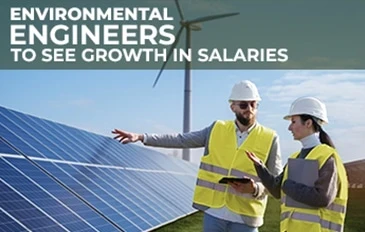
Environmental Engineers to See Growth in Salaries
Environmental engineers, whose job is to prevent or reduce the negative impact that humans have on the world, can look to an increase in job opportunities and salaries in coming years.
Outlook
According to the U.S. Bureau of Labor Statistics, employment in environmental engineering is expected to grow by 5% from 2018 to 2028. Increasing concern over global warming, as well as air and water quality, have driven the demand for more workers in this field.
As of its May 2019 report, the median salary for this group was $88,860 per year, or $42.72 per hour. This ranged from $53,330 for the lowest 10% of earners in the field, to $142,070 for the highest 10%. States with the highest levels of employment are California. Texas, New York, Pennsylvania, and Massachusetts —but jobs are available throughout the country and internationally.
The U.S. News and World Report overview ranked environmental engineering as #3 in Best Engineering jobs, #21 in Best STEM jobs, and #48 in Best 100 jobs. The report gave an “Above Average” rating for upward mobility, which means that it offers good opportunity for advancement and salary increases.
What Is an Environmental Engineer?
Environmental engineers have their choice of a variety of industries and locations. They might work in an office or out in the field. They are “housed” within other industries, including resource industries such as forestry, mining, pulp and paper, chemical processing, fisheries, agriculture, and oil and gas. Environmental engineers also can work in areas such as research, education, training, or consulting. Beyond those high-level areas, environmental engineers can specialize and focus on improving recycling, waste disposal, public health, or water and air pollution control. Or they can work on global issues, such as the quality of drinking water, concern about climate change, or environmental sustainability.
The education and qualifications required are generally a bachelor’s degree in environmental engineering, or another engineering field. But employers also look for hands-on experience; as such, cooperative programs that award credit for structured job experience are also valuable. To be successful in this field, candidates need technical knowledge in their focus area, hands-on problem-solving skills, and an understanding of environmental issues.
Although environmental engineering focuses on technical skills, the job often involves business and political concerns, which creates a unique learning experience. A U.S. News & World Report overview of best jobs states that “In many ways, environmental engineers work at the intersection of regulations, technology, and people, and they’re responsible for making them all work together.” On a normal day, an environmental engineer might write an environmental report, or design a project to protect the environment. They might review regulations and advise governments or business leaders about potential concerns. Or they could inspect industries for compliance to regulations.
Getting a Job as an Environmental Engineer
The U.S. Bureau of Labor Statistics gives data on the percentages of jobs in each industry and each state, which may be a good place to start if you want to work in a specific area. Another option is to look at job posts near you to see what kinds of environmental engineering jobs are available there. When it comes to environmental concerns, each geographic region will have different challenges, so if you want to stay in a certain area, you should focus on learning about the problems that need addressing there. Find out what the most urgent needs are where you want to work, and study them.
Hands-on experience is equally important. It will give you a better foundation for your knowledge, skills to list on your resume, and it can help you decide what kinds of projects you most want to work on. Some colleges offer cooperative programs that allow students to gain practical experience while they complete their education, and some companies will help pay for your education while you work for them and gain experience.
Michael DeSafey is a leading executive recruiter for professionals in the construction, engineering and environmental industries. He is currently the President of Webuild Staffing www.webuildstaffing.com . To learn more about Michael or to follow his blog please visit www.michaeldesafey.com
Category: Career Training, Engineering, Environmental, Interview And Job Search Tips, Jobs
